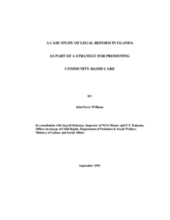The principal aim of this study is to review the recent legal reform/review process in Uganda from the particular perspective of how it has promoted community-based care. The two reform measures that will be described and analyzed from this view point are the Approved Schools (Babies and Children's Homes) Rules, 1991 (Statutory Instruments No. 13 & 14) and the Child Law Review Committee's (CLRC) proposals concerning the reform of various laws concerning children as presented to government in its Report of March 1992. The Babies and Children's Homes Rules which will be referred to as "the Rules" were as Statutory Instruments reviewed and approved by Cabinet and then gazetted in August 1991. As addendums to the Approved Schools Act they did not have to be approved by the elected national assembly, the National Resistance Council (NRC). In contrast the CLRC Report is a major piece of legislation which will require the approval of the NRC. Its proposals if passed will necessitate the repeal of four existing Acts and changes to three others.

